Source: The Catholic World Report
October 5, 2016
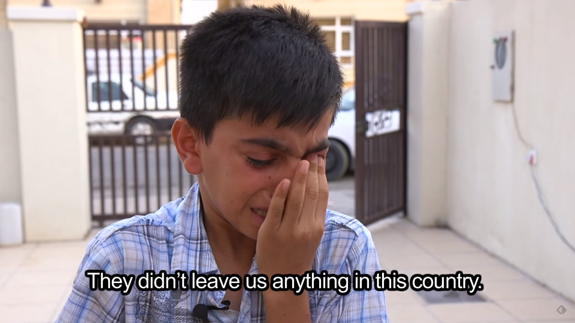 A scene from the trailer of the new documentary on Middle East Christians, "Our Last Stand." (Image via ourlaststandfilm.com)
A scene from the trailer of the new documentary on Middle East Christians, "Our Last Stand." (Image via ourlaststandfilm.com) A young boy, 10 years old or so, faces the camera.
Like many young boys, he is happy to be interviewed.
This is war-torn Iraq, however, so he tells of the day ISIS came to his village. He starts to recount, horror after horror, what took place. It is hard to accept that one so young has already seen so much evil. Gradually, his retelling of what happened slows and he breaks down. It is hard to watch as the tears flow down his cheeks. He tries to stem them, brushing them away…but to no avail. His grief is too great. He is now talking to himself as much as to the camera. He talks of when he used to go to school, ride his bicycle and play soccer with his friends—he stops. Again, he looks at the camera, finishing with the words: “Now all that is gone…”
This is just one of the harrowing testimonies in the new documentary Our Last Stand. The award-winning film tells the story of what is left of the ancient Christian communities in Iraq and Syria. ISIS, along with other Islamic extremists, is destroying the lives and the lands of Christians who have for centuries lived in peace with their more numerous Muslim neighbors. In this latest genocide, no one came to the aid of the Christians. They looked to the West, but no avail.
I recently spoke with the filmmakers, Jordan Allott and Helma Adde, after a screening ofOur Last Stand.
CWR: What was the genesis of Our Last Stand?
Jordan Allott: For a number of years, I had been traveling in the Middle East doing work (shooting video, writing, taking photos) for an organization called In Defense of Christians. As I was learning more and more about the region, I was constantly thinking how best to present the plight of Christians in places like Iraq and Syria to a Western audience through film. Once I met Helma, who is a schoolteacher from New York (I was on a Fox News program with her father, who is a Syriac Orthodox priest) I knew she could act as a bridge between her family and community in Syria and an American or Western audience. After convincing Helma to travel with me, we set out to plan our journey to Iraq and Syria.
CWR: What were you hoping to achieve by making this documentary?
Allott: Our goal was to make a variety of audiences more aware that Christians exist in this part of the world, of the plight they have been suffering for generations, and of the important role they play in their societies. We also wanted to personalize the situation and make what can often seem like an overwhelming and intimidating problem more relatable to Western audiences.
CWR: Do you think you succeeded?
Allott: Through Helma, the lead protagonist, and the many sub-characters we spend time with, I think we do succeed in having the audience connect with not just the individuals we meet, but the larger problem at hand. The feedback we have received so far has been overwhelmingly positive and it has been interesting to hear how and why different audiences connect with different parts of the film.
CWR: Were you concerned about reporting from a war zone?
Allott: Of course there is some concern when traveling to war zones, especially to the front lines. But I learned a long time ago that the ability to overcome fear and to let your desire to stand in solidarity with—and work on behalf of—the persecuted, is a skill that can be developed like any other. Taking the necessary precautions, carefully planning your travels, and trusting in the right people will cut down on the risks significantly. Much of our travel was coordinated with three different Assyrian/Chaldean/Syriac militias in Iraq and Syria.
CWR: Were you in any way prepared for what you found in Iraq and Syria?
Helma Adde: I heard many stories from fellow parishioners and friends who have family in Iraq and Syria…about the lack of basic needs, and people fleeing to Lebanon or possibly Europe if they were lucky. I even knew people who had to send money to Iraq for the ransom collected to free a kidnapped family member. Sadly, after you hear so many of these devastating stories, they just don’t surprise or shock you anymore. But experiencing them and hearing the first-hand accounts from people on the ground in Iraq and Syria was an experience that shook me. Hearing a story about the harsh living conditions in the refugee camps makes you feel bad, but actually seeing the mother in the refugee camp stacking old blankets into an empty milk crate she’s using as a baby seat for her infant child is a sobering experience that no one can prepare themselves for.
CWR: Of all the many poignant and thought provoking encounters in this film, what stands out most for you?
Adde: There are so many touching moments, like the boy in Erbil who broke down in front of the camera while talking about his sick mother, or my tour of Alqosh, where I had the chance to put my hands on the same ancient walls touched by my ancestors thousands of years before me.
But for me, the scene that stands out the most is when I am reunited with my family in Syria. Iraq has been traversed more often lately, but getting to Syria was particularly difficult because of the chaos and destruction the civil war has caused. Borders are not secure or safe, and the situation there changes daily. Many of my friends and family called me before I left to urge me to stay away from Syria. It was hard to ignore their advice, and each conversation gave me more and more anxiety. I was specifically advised to stay under the radar during my travels, but the fact that I was traveling with an American journalist made it difficult to be discreet. But I did my research, made contacts with the right people, did everything that I could to insure a safe passage into Syria, and left the rest up to God.
When I finally saw my aunt in Syria and hugged her at church for the first time after 16 years, you can see the joy on my face. But when I see myself on the screen now, surrounded by my cousins around the kitchen table, I remember what I went through to get there, and how I might never, ever be able to go there again. And then I get angry that this has been the fate of my people for so many generations…the cycle of genocide continues to drive us out of our homeland, essentially driving us apart from each other forever.
CWR: How did it feel to be only meters away from ISIS?
Adde: When we made arrangements prior to arriving in the Middle East, people advised us where to go and which areas were “safe.” But when we actually got there, we realized that these “safe” areas were always only a mere 20-30 miles away from ISIS territory. To me, that sounded unbelievable! And what was even more amazing to me was how everyone just carried on with their daily tasks! I mean, I knew they were afraid, but they somehow found the courage to keep going. And their courage was infectious, because I too kept going, from one refugee camp to the next, crossing through one checkpoint to the next, and one town to the next. It was all very surreal.
CWR: Was it difficult to get funding for this production?
Allott: The film was self-funded by both me and Helma and my production company, In Altum Productions. We have received help in distribution by In Defense of Christians and A Demand for Action. Our thought was that instead of spending time looking for funding, we wanted to start filming on the ground as soon as possible. We knew that if we were able to produce a high-quality documentary, it would gain momentum and accomplish its goals. This is what has happened. Now that the film is finished, we are looking at new ways that groups can support our on-going distribution needs. Our goal is to distribute the film to as many people as possible, by whatever means possible.
CWR: How long did it take to produce and shoot?
Allott: It took about a year. I had other projects I was working on and Helma had her job as a schoolteacher, but we spend any free moment we had writing, filming, editing, and helping to publicize the film through the media.
CWR: Do you hope to make more films on Middle East Christians?
Allott: Yes. Unfortunately the problems highlighted in Our Last Stand are not going to go away any time soon. There are some positive steps being taken, but it is very incremental. At some point in the future, I would love to do a follow-up film…revisiting some of the places and people we met with on our first journey. Also, I am currently planning a trip to Damascus and Aleppo in Syria to highlight the work of Catholic aid workers in these war-ravaged cities.
CWR: How hard was it to be among your family and people while genocide is being perpetrated against them?
Adde: I felt very conflicted inside. On the one hand, I felt strong to be standing in solidarity with my people, right there in our ancient homeland. I felt good about the fact that I could help be their voice by sharing their stories with the rest of the world. But on the other hand, I also felt the emptiness and sorrow that now filled the once-vibrant communities. I experienced the reality of the on-going genocide, and felt the frustration of not being able to effect change fast enough! On my way back to Iraq from Syria, one of the soldiers who dropped me off at the border left me with very sad but inspirational words when he said, “Helma, we need people like you here, we need you to come back and help us. This is a very crucial time for our people, please don’t forget about us.” His words reminded me that while I am lucky to have the freedom to go back to my comfortable life in the States, I have a duty to use my freedom to help secure their rights back home as well.
CWR: Some of the militia members you interviewed are now dead—how does that leave you feeling?
Adde: I pray for the families of the departed soldiers every day. I formed a special bond with those men after hearing some of their individual stories. One of them told me he left dental school at the University in Aleppo at the start of the revolution to come back to Qamishly and defend his hometown. Another was a newlywed whose wife was expecting their first child. These men represent hope for our people still living in our homeland. But compared to the other forces battling in the area, this militia is small. So every single soldier we lose is a huge loss for our community.
CWR: What more can Western governments do, in your view?
Adde: There is an immediate need for humanitarian aid to be provided, especially to the churches that are maintaining the camps for Christian refugees. Many of these refugees do not go to the UN camps because radicalization makes them unsafe for Christians. And so they flock to the churches, many of which have become overcrowded and are struggling to provide for the growing number of refugees.
Western governments all must recognize the genocide that is taking place against the Assyrian Chaldean Syriac Christians, the indigenous people of Mesopotamia. That is the first step in breaking the cycle of genocide that has afflicted this community for generations. It will also force countries to send more aid and effect policies that will ensure future safety for these people in their homeland.
And finally, now more than ever, it is essential to secure an internationally recognized and protected safe haven for Christians in the Middle East in their ancient homeland, the Nineveh Plain. This plan is outlined in a resolution recently put forward by Congressman Fortenberry, who addresses the right of these people to live in their ancient lands, where they can maintain their ancient culture and practice their religion freely. If we want Christianity to endure in the very place where it originated, we have to make it safe for Christians in Iraq and Syria to stay, or to return from the neighboring countries where they have temporarily sought refuge. Western governments need to recognize this need, and help the Christians secure this safe haven by whatever means possible.
Allott: On that last point if I could just add how important it is that we in the international community work to help these Christian communities stay in their ancestral homeland, as opposed to leaving as refugees. This is not only their right and vital to keeping their heritage alive, but also an important variable in promoting a stable, moderate, pluralistic region.
CWR: What plans have you for publicizing Our Last Stand?
Allott: We are leaving no stone left unturned when it comes to distribution, publicity, and marketing of the film. We have had a great start and hope more and more people and organizations will want to help us spread the film. We have already had premieres in New York and Washington, DC, and have screened in a number of other cities and at film festivals around the US. We have plans to screen the film in another dozen or so cities and festivals around the country, and in Europe and Australia over the coming few months. The film has also received a lot of media attention through news articles and social media, as well as with TV and radio interviews. We have a very active Facebook page and website where we encourage people to contact us if they have interest in screening the film.

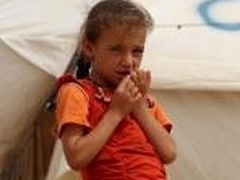

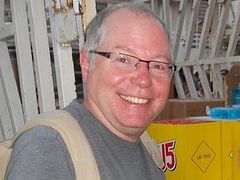
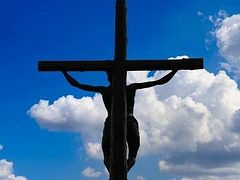
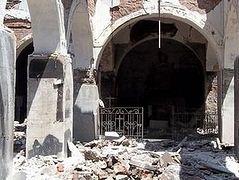
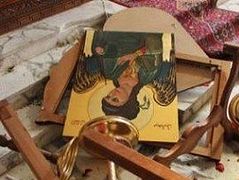
I would like a copy of your movie and would be willing to purchase it.
God grant you many years!